
The Nursing and Midwifery Council (NMC) is the regulator for nursing and midwifery professions in the UK. The NMC maintains a register of all nurses, midwives and specialist community public health nurses and nursing associates eligible to practise within the UK. It sets and reviews standards for their education, training, conduct and performance. The NMC also investigates allegations of impaired fitness to practise.
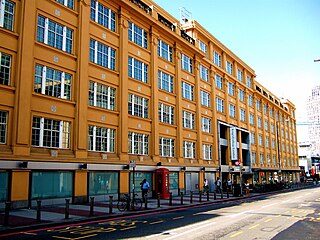
The Florence Nightingale Faculty of Nursing, Midwifery & Palliative Care is an academic faculty within King's College London. The faculty is the world's first nursing school to be continuously connected to a fully serving hospital and medical school. Established on 9 July 1860 by Florence Nightingale, the founder of modern nursing, it was a model for many similar training schools through the UK, Commonwealth and other countries for the latter half of the 19th century. It is primarily concerned with the education of people to become nurses and midwives. It also carries out nursing research, continuing professional development and postgraduate programmes. The Faculty forms part of the Waterloo campus on the South Bank of the River Thames and is now one of the largest faculties in the university.
Nursing in the United Kingdom has a long history. The current form of nursing is often considered as beginning with Florence Nightingale who pioneered modern nursing. Nightingale initiated formal schools of nursing in the United Kingdom in the late 19th and early 20th centuries. The role and perception of nursing has dramatically changed from that of a handmaiden to the doctor to professionals in their own right. There are over 700,000 nurses in the United Kingdom and they work in a variety of settings, such as hospitals, health centres, nursing homes, hospices, communities, military, prisons, and academia, with most working for the National Health Service (NHS). Nurses work across all demographics and requirements of the public: adults, children, mental health, and learning disability. Nurses work in a range of specialties from the broad areas of medicine, surgery, theatres, and investigative sciences such as imaging. Nurses also work in large areas of sub-specialities such as respiratory, diabetes, cancer, neurology, infectious diseases, liver, research, cardiac, women's health, sexual health, emergency and acute care, gastrointestinal, infection prevention and control, neuroscience, ophthalmic, pain and palliative, and rheumatology. Nurses often work in multi-disciplinary teams but increasingly are found working independently.

Dame Elizabeth Nneka Anionwu is a British nurse, health care administrator, lecturer, and Emeritus Professor of Nursing at the University of West London.

The Frontier Nursing Service (FNS) provides healthcare services to rural, underserved populations since 1925, and educates nurse-midwives since 1939.
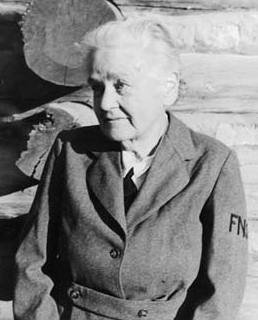
Mary Carson Breckinridge was an American nurse midwife and the founder of the Frontier Nursing Service (FNS), which provided comprehensive family medical care to the mountain people of rural Kentucky. FNS served remote and impoverished areas off the road and rail system but accessible by horseback. She modeled her services on European practices and sought to professionalize American nurse-midwives to practice autonomously in homes and decentralized clinics. Although Breckinridge's work demonstrated efficacy by dramatically reducing infant and maternal mortality in Appalachia, at a comparatively low cost, her model of nurse-midwifery never took root in the United States.

Queen Charlotte's and Chelsea Hospital is one of the oldest maternity hospitals in Europe, founded in 1739 in London. Until October 2000, it occupied a site at 339–351 Goldhawk Road, Hammersmith, but is now located between East Acton and White City, adjacent to the Hammersmith Hospital. It is managed by the Imperial College Healthcare NHS Trust.
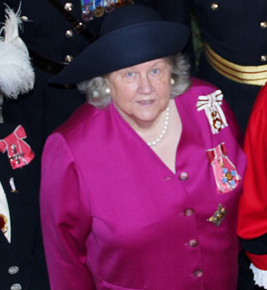
Dame Lorna Elizabeth Muirhead is a past President of the Royal College of Midwives and from 2006 until her retirement in 2017 she served as the Lord Lieutenant of Merseyside.
Dame Karlene Cecile Davis, DBE is a former General Secretary of the Royal College of Midwives, Director of the WHO Collaborating Centre for Midwifery, Regional Representative for Europe in the International Confederation of Midwives, a Fellow of the Royal Society of Medicine, and a member of the Wellbeing Council at the Royal College of Obstetricians and Gynaecologists.

Dame Mary Rosalind Paget, DBE, ARRC, was a noted British nurse, midwife and reformer. She was the first superintendent, later inspector general, of the Queen's Jubilee Institute for District Nursing, which was renamed as the Queen's Institute of District Nursing in 1928 and as the Queen's Nursing Institute in 1973.

Dame Anne Marie Rafferty FRCN is a British nurse, academic and researcher. She is professor of nursing policy and former dean of the Florence Nightingale Faculty of Nursing, Midwifery and Palliative Care at King's College London. She served as President of the Royal College of Nursing from 2019 to 2021.
The history of nursing in the United Kingdom relates to the development of the profession since the 1850s. The history of nursing itself dates back to ancient history, when the sick were cared for in temples and places of worship. In the early Christian era, nursing in the United Kingdom was undertaken by certain women in the Christian Church, their services being extended to patients in their homes. These women had no real training by today's standards, but experience taught them valuable skills, especially in the use of herbs and folk drugs, and some gained fame as the physicians of their era. Remnants of the religious nature of nurses remains in Britain today, especially with the retention of the job title "Sister" for a senior female nurse.
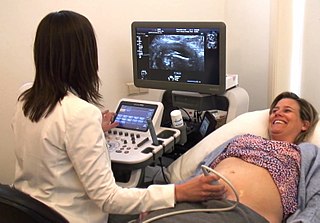
A midwife is a health professional who cares for mothers and newborns around childbirth, a specialization known as midwifery.
Dame Catherine Lilian "Cathy" Warwick is a Scottish midwife, trade union leader, and abortion rights activist. She has been the Chief Executive of the Royal College of Midwives from 2008 until 2017, and is also Chair of Trustees of BPAS, one of the UK's leading providers of abortion services.
Margaret (Maggie) Fraser Myles, née Findlay, was a Scottish midwife, midwifery tutor and lecturer and author. She is globally known for her Textbook for Midwives, first published in 1953, which has been considered a reference midwifery textbook for decades.
Elizabeth Mary Chiarella AM is an Australian academic who specialises in issues relating to nursing, midwifery and the law. She is Professor Emerita at the University of Sydney, Australia and has been at the forefront of many regulatory changes to nursing practice and the nursing workforce and midwifery. These include the introduction of nurse practitioners into Australia, the move from a state based to a national regulatory system and, for midwifery, the introduction of the world's first Doctor of Midwifery and the establishment of the framework for state funded home birth midwifery in New South Wales (NSW), Australia. She is a nurse and midwife, who specialised initially in anaesthetic nursing and later in palliative care.
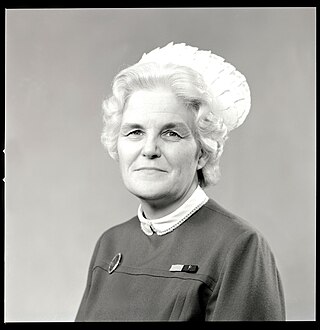
Mary Kathleen Robb, OBE, OStJ, FRCN, was a nurse from Northern Ireland. Robb was the last matron of the Royal Victoria Hospital in Belfast and steered nursing services across the city during the height of The Troubles. Robb was an advocate for the Royal College of Nursing (RCN) and was a board member for 20 years.
Margaret Dorothy Green OBE FRCN (1929–2017) was a senior Royal College of Nursing employee from 1966 to 1990 and was instrumental in setting up the UKCC, the forerunner of the Nursing and Midwifery Council. Through UKCC, Green introduced major changes to nurse education such as Project 2000 and PREP.

The Nurses, Midwives and Health Visitors Act 1979 was an Act of Parliament of the United Kingdom. It received royal assent in April 1979.
The Judge Report (1985) or the Report of a Commission on Nursing Education was the report of a committee established by the Royal College of Nursing to consider a different approach for nursing education in the United Kingdom.











